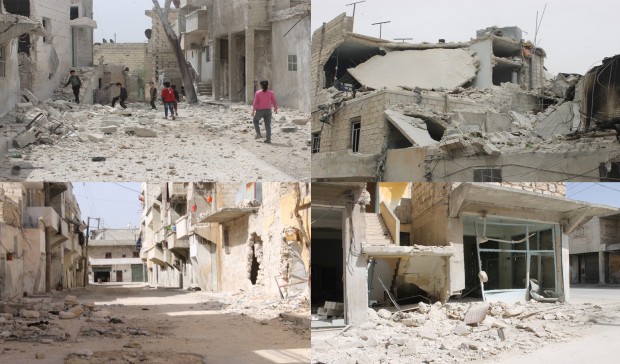Washington Kurdish Insitute
Yousif Ismael June 30, 2017
The People’s Defense Units (YPG) released a statement concerning the recent attacks and violations by the Turkish military on and around the Kurdish city of Afrin in northwestern of Syria. In the statement, the YPG disclosed that, in the past week, Turkish-backed armed groups and the Turkish military attacked the outskirts of Afrin numerous times. The attacks targeted several villages of four districts in Afrin using mortars, tanks, and machine guns. In this statement, the YPG also said that Turkish unmanned aerial vehicle (UAV) flew over the west of Kobani city. Mehmud Berxwedan, the commander of the YPG forces in the city of Afrin, told Voice of America that Turkey will face resistance if they enter Afrin city. He said, “Turkey should know that Afrin and Shahba [in Aleppo’s countryside] are not like Jarablus and al-Bab, and the daughters and sons of these regions will defend their areas against the Turks until the end” and that “Turkey will be plunged into a swamp, politically and militarily – there will be an historical resistance against Turkish occupation in Afrin and Shahba region.”
On June 20, the Turkish military entered northern Syria with heavy weapons in preparation to attack Kurdish areas. Afrin, a predominantly Kurdish city located about 60km from Aleppo, currently hosts approximately 500,000 internally displaced persons who were driven from their homes over the last few years of civil war in Syria. Afrin is managed by the self-administration authorities of the Democratic Federation of Northern Syria, and the city’s security is managed by the YPG and YPJ, who are part of the U.S.-backed Syrian Democratic Forces (SDF). The YPG/J and the SDF are currently battling ISIS in their primary stronghold in Syria, the terrorist organization’s de facto capital of Raqqa. Afrin shares borders with areas held by the Syrian regime and others controlled by Islamist armed groups backed by Turkey and the Turkish military. The pro-Turkish government newspaper Daily Sabah reported that Turkey will be targeting the Kurdish forces in Afrin. The Turkish military launched a similar operation in August of 2016 with the name Euphrates Shield, in which armed Islamist groups organized and supported by Turkey made moves to control the areas of Jarablus and al-Bab. This Euphrates Shield campaign resulted in a large number of civilian casualties as well as substantial Turkish military losses in terms of both casualties and lost military equipment.
Rezan Hedo, a human rights activist and political analyst, reported to WKI that the Turkish bombardment of Afrin and the Shahba region began in February 2016 and has “continued intermittently to this day.” Furthermore, Hedo says that Turkey-backed groups have been shelling Afrin and the Kurdish neighborhood of Sheikh Maqsoud in Aleppo since 2012. “They have used chemical shells and imposed a siege on the Kurdish neighborhood,” he added.
On May 13, 2016 Amnesty International released a report on armed opposition groups committing war crimes specifically in Sheikh Maqsoud targeting “civilian homes, streets, markets and mosques, killing and injuring civilians and displaying a shameful disregard for human life civilians and homes.”
Hedo explains that Turkey’s backed-armed groups belong to the Muslim Brotherhood “like Faylaq al-Sham (The Sham Legion) and Ahrar al Sham.” Hedo believes that Turkey has “strong relations” with jihadist groups in Syria as Nour al-Din al-Zenki Movement and al-Qaeda affiliates of Hay’at Tahrir al-Sham (Organization for the Liberation of the Levant). Hedo says that the extremist groups in Syria consider the Kurds as “infidels and atheists” since they are not extremely religious. “During the Euphrates Shield operation, ISIS members in Jarablus city changed their flags to flags of Turkey’s-backed groups,” he explained, and shared the same concerns of others in Syria that Turkey’s attacks on Kurdish forces are aimed at disrupting the operation to liberate Raqqa from ISIS. “Turkey knows that attacking Afrin will push the SDF to leave the Raqqa front to assist in the protection of civilians in Afrin,” he said. Additionally, Hedo explains, Turkey wants to control parts of Aleppo AND is eager to connect its areas of influence in the east and west of Syria and force the Kurds to leave their areas and become refugees, changing the demographics in the region. With respect to long term strategy, Hedo believes that “securing the mountains in Afrin will allow for a safe haven to protect jihadist groups, including al-Qaeda affiliates, from air strikes similar to the Tora Bora mountains in Afghanistan.”
Mr. Hedo concluded his interview by calling upon the international community to stop using the Kurds as “political cards,” and reiterated that the entire world has witnessed that the Kurds in Syria have not pointed their weapons at anyone except for terrorists. “It is immoral that the international community deals with the Kurdish as a card in the political bazaars. The international community have a moral duty to protecting the mothers, fathers, and children of those who currently fight against terrorism in Raqqa, Hasakah, Aleppo, and elsewhere.”
The tensions remain high in Afrin as the city of Mosul in Iraq has now been liberated, and Raqqa will follow Mosul in being freed from the menace of ISIS if Turkey does not stay in the way of the U.S.-led international coalition and Kurdish fighters who aim to put an end to the dark reign of ISIS.
Disclaimer: The views, opinions, and positions expressed by authors and contributes do not necessary reflect those on the WKI.


